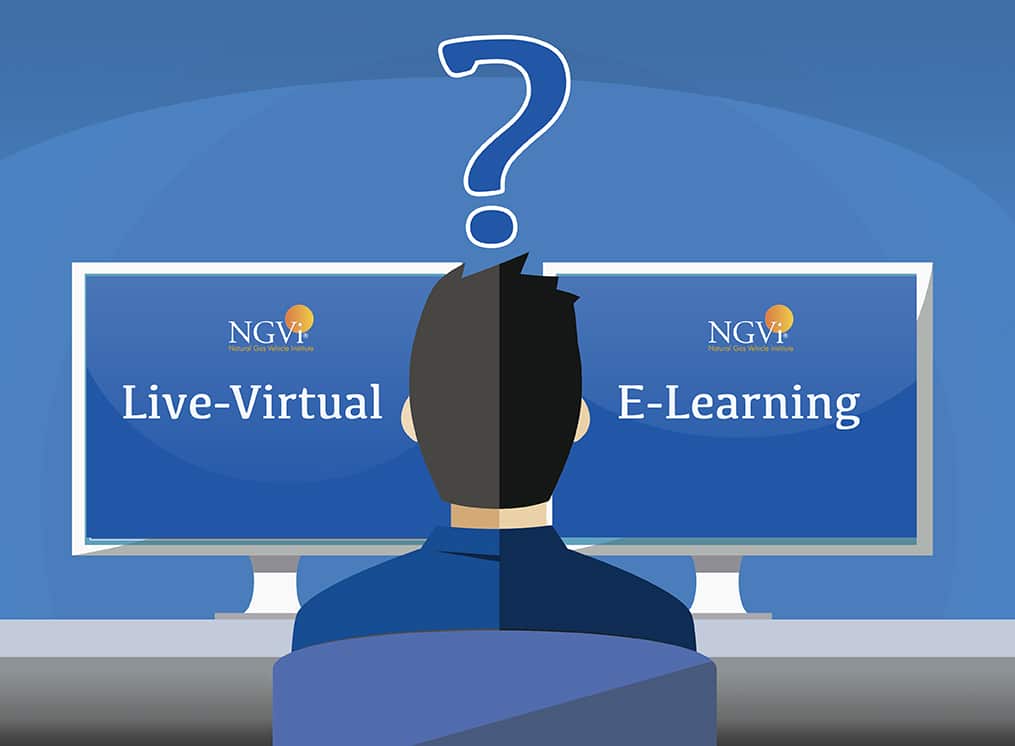CNG training is essential to all technicians who work on or near natural gas-powered vehicles. That training may be as fundamental as learning the safety requirements that are unique to natural gas vehicles, or as involved as exploring the complexities and intricacies of heavy-duty CNG fuel systems and engines. Regardless of what level of knowledge or skills your technicians need to do their jobs, NGVi offers multiple in-person and online classes to educate them. Online classes are available in two delivery modes: live-virtual and on-demand e-learning. Read on to learn more about the benefits of each, and whether it’s time to enroll.
Live-Virtual
Live-virtual training was popular before the pandemic, and has become even more relevant since. Technicians enjoy this kind of learning environment because they’re able to engage with their peers in a digital classroom, regardless of where they’re physically located. They don’t have to worry about coordinating travel or hotel expenses that in-person training requires, which gives them more time to focus on the course material, ask questions during class, and get real-time answers directly from their instructors.
Scheduled on specific days, live-virtual classes also tend to fill up the fastest. They often focus on safety essentials, CNG fuel system inspector training, heavy-duty NGV engine and fuel system maintenance and diagnostics, as well as CNG fueling station operations and maintenance.
E-Learning
Our on-demand e-learning was developed for technicians who need greater flexibility on how and when they can access and study our course materials. If our live-virtual, public training is either full or held during times when your technicians are not available, they can enroll in e-learning to gain access to the exact same CNG training content and review it at their own pace. They can also save their progress and return to that material whenever they want.
Benefits for technicians considering e-learning include: immediate access to course materials as soon as they’re enrolled; continued access to those materials 24/7; the ability to space out learning in increments, rather than in one specific time period; and cost savings that are similar to those for live-virtual training.
E-learning options currently include: introductory training for NGV drivers on how to operate and fuel vehicles; essential safety for technicians and support teams; CNG fuel system inspector training; heavy-duty engine and fuel system maintenance and operation; CNG fueling station operations and maintenance; and fueling station codes, standards, and regulations.
Which CNG Training Mode Is Right for You?
To decide which CNG training mode is the best option for your team, consider when courses are offered, what each course covers, and whether your technicians prefer to learn solo or as a group in real time.
Here’s a quick breakdown of each course we currently offer.
Natural Gas Vehicle Driver and Fueling. This 40-minute, on-demand course explores the elements and standards of safe driving and fueling for all types of natural gas vehicles.
NGV Essentials and Safety Practices. This one-day, on-demand course explains the fundamentals of natural gas as a fuel (both liquid and compressed natural gas), the purpose and function of fuel system components of any CNG vehicle, and the safety procedures that must be in place to protect your workers.
CNG Fuel System Inspector Training. This course ensures technicians have the ability to conduct full, accurate CNG fuel system inspections that abide by all industry codes and standards. It also offers the necessary prep work should your technicians wish to obtain their inspector certification.
Heavy-Duty NGV Maintenance and Diagnostics Training. This course focuses on critical safety knowledge and best practices when repairing both Cummins heavy-duty natural gas engines and any CNG fuel system, regardless of manufacturer.
Cummins INSITE and QSOL Software. This course teaches technicians basic and advanced functions with the best tools for diagnosing Cummins engines.
Essentials of CNG Station Operations and Maintenance. This course explores the complexity of CNG fueling stations, the required safety practices, and the preventative maintenance that will keep them running for years to come.
CNG Fueling Station Codes, Standards, and Regulations. As the name implies, this course explains the numerous codes, standards, and regulations that must be taken into account when designing and building CNG fueling stations — including fire, mechanical, electrical, and building codes.
Do You Have Technicians To Enroll?
Are you ready to take advantage of live-virtual or on-demand e-learning CNG training? As the only ASE-accredited training provider in the alternative fuels industry, NGVi is proud to offer available courses year round. Compare our public training and on-demand options to see which ones are the right fit for your team. If you have any questions about the material above, don’t hesitate to give us a call at 800-510-6484.

